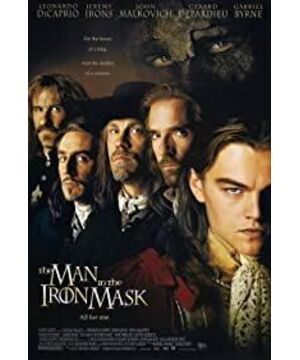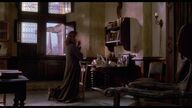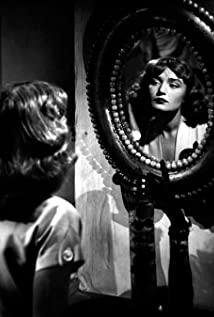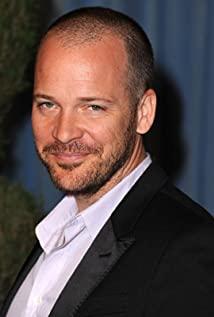When I first came to Xunlei to download this movie, I saw a choking comment: classic, it is incomprehensible for the post-80s generation. What do you mean, buddy, it doesn't matter whether you are 70, 60 or 50, please don't take the post-80s to order. I would like to ask today's post-80s generation who did not read famous novels since childhood, grew up with "Three Kingdoms", dreamed with "Red Mansions" under their pillow, looked at the world from the perspective of "Twenty Thousand Leagues Under the Sea", and even started thinking about "War and Peace" since childhood. I have seen the film "The Man in the Iron Mask" adapted from Alexandre Dumas' "Viscount Brajelona", and I can't say how much I understand it, but at least I understand it by no means shallower than you. Because if you know the film or the medieval history of Alexandre Dumas well, you can't make the above worthless and annoying nonsense. Of course, I can't represent all the post-80s generation, because there are many people who are better than me.
OK, let's start talking about movies.
This movie, which changed the original book beyond recognition, still deeply attracted me after the initial shock, perhaps because of the beautiful picture, or the forbearance of love.
Similarly, I saw this film before I heard JJ Lin's "Tomorrow". What impressed me the most was the final parting. There was no sensational language, no uncontrollable passion. Looking at it from a distance, it might be the last look. Leaving a rose represents the love that has been stabbed in this life.
The most commendable thing is the beautiful shots of the film. Whether it is a gorgeous costume or a quiet and solemn, the director chose two places that express the most beautiful: the dance and the church. The dances at the dance are staggered, and behind the golden mask hides a terrifying iron face. And the quiet Yiren of the church, a thousand words conveyed by a rose. After that, go to listen to the lyrics: leave a rose on your pillow, don't regret it if you don't ask, this moment is the most beautiful, and you often have an alternative perception. In addition, the gorgeous costumes and the magnificent palace make the film win all the praises in the overall picture.
Moreover, since the story itself is a folklore, there is no need to comment too much on the achievements of Louis XIV. But just from the depiction of his cruel character, the wanton abuse of his feelings, the cruel oppression of the people, and even the persecution of his twin brothers, he has completely outlined his dehumanized and twisted soul.
It is far from enough to comment on the connotation of the original from just one movie, because this is only one of the trilogy, so the clever screenwriter changed the purpose of creation. Since the iron face is involved, it must have a deeper symbolic meaning. At the end of the film, D'Artagnan said the sentence through Philip's mouth when he was dying: It turns out that you are the one who has been wearing a mask. The lover is the queen of today, and the son is the majesty in the palace, but he forbears his unswerving love to the death and condones this mischievous son. All this only stems from love to the depths, blind eyes, and put a mask on yourself for the unknown.
View more about The Man in the Iron Mask reviews











